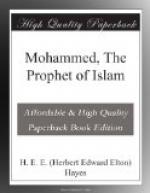The varied experiences he passed through on his caravan journeys did much to influence his future policy; indeed, it appears that all influences brought to bear upon his early life were forces that moulded and equipped him for the office he was to fill. He was keenly observant, and wonderfully accurate in his inferences, especially in his estimate of the characters of men with whom he had to deal. He seemed to lack initiative, for he was always reluctant to take action in any important undertaking; but once the initial step was taken, he pressed forward with indomitable courage. In his business transactions he proved himself to be shrewd and tactful, and by his fidelity, patience, and self-confidence, gained the respect and esteem of his immediate fellows.
Khadijah, a rich widow, having entrusted Mohammed with the control of an important caravan, and finding how admirably he had performed his part, wisely concluded that her interests would be furthered if he had a share in them. Hence their marriage, which happy arrangement proved to be mutually blessed and successful. It vastly improved Mohammed’s social standing, raising him to a position of equality with the leading men of the city. For many years he was content to live quietly as an ordinary citizen, engrossed in the accumulation of wealth by legitimate trading.
II.—THE “CALL” TO THE PROPHETIC OFFICE.
It has not been recorded how first he began to yield to the impulses that eventually led him to assume the role of reformer, but it is certain that at the age of forty he was the leader of a secret society, which had for its object the political and religious unity of the Arab people. He knew that far-reaching changes were necessary in every department of national policy before his ideal could be realised. Unity was the secret of power and prosperity. This he had learned through contact with other nations. His dealing with Jews and Christians had given rise to a deep appreciation of the value of a monotheistic faith in the consolidation of a people, and he was convinced that political unity would be achieved only where there was religious unity. With masterly insight he laid his plans accordingly, and because of the extreme conservatism was obliged to formulate them in strict secrecy. Unfortunately, owing to his untrustworthy sources of information, his policy was founded upon false bases. His distorted conception of truth led him to establish a system of false philosophy and theology so framed as to allow of no alteration or adaptation. In his elaboration of the system, he depended much upon his own meditative habits, and no doubt thought it all out in the loneliness of the mountains, to which he frequently retired for the observance of certain ascetic customs of the Pagans. Thus his scheme of reform crystallised into definite shape, and his call to the prophetic office became a fixed idea.




